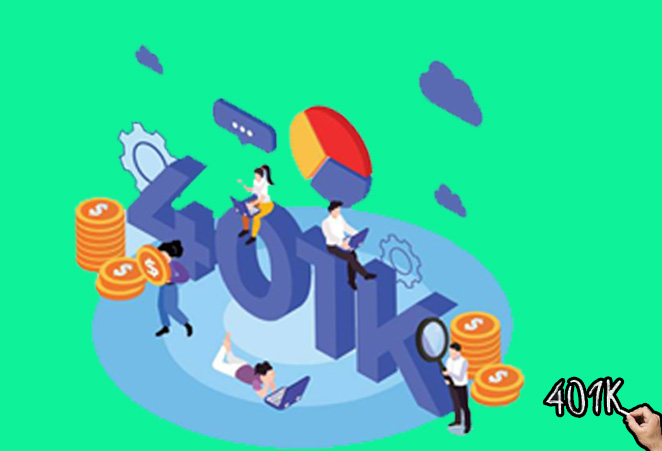A 401(k) loan is a potential option for those unfamiliar with it. It allows you to borrow money directly from your retirement savings account, essentially lending to yourself. Your employer’s plan usually sets repayment terms with a maximum loan amount and a fixed repayment period (typically repaid through payroll deductions).
But before you tap into your retirement nest egg, carefully weigh the pros and cons. This blog is your guide, exploring the advantages and disadvantages of 401(k) loans to help you decide if it’s the right financial move for your situation.

401(k) Loan: How Does It Work?
Unlike a traditional loan from a bank, a 401(k) loan is essentially borrowing money from yourself. There are, however, limitations:
- Borrowing Limits: The IRS sets a maximum borrowing limit of 50% of your vested account balance, up to a maximum of $50,000. Vested means the portion of your contributions your employer considers yours (employer contributions often vest over time).
- Repayment Timeframe: In most cases, you have five years to repay the loan. There’s an exception for loans used to purchase a primary residence, which can extend to 15 years.
- Interest Rates: The interest rate on a 401(k) loan is typically set by your plan administrator and is usually lower than what you’d find with other loan options. Here’s a key point: you pay the interest to your account. While it may seem like a wash, it’s important to remember that this interest is typically paid with after-tax dollars, reducing your overall retirement savings growth.
Eligibility:
While most 401(k) plans allow loans, there’s no guarantee. Here’s what can affect your eligibility:
- Employer Requirements: Your employer can set additional restrictions or even prohibit loans altogether. Check your plan documents or consult your HR department for specifics.
- Outstanding Loans: If you have an existing 401(k) loan that has yet to be repaid, you generally won’t be eligible for another one.
- Employment Status: Leaving your job can trigger a default on your loan. Your plan may require full repayment within a short period, so factor this in before borrowing.
Repayment:
Repayments for 401(k) loans are typically made through automatic payroll deductions, ensuring you stay on track. However, missing payments can lead to severe consequences:
- Tax Implications: If you default on your loan (usually by leaving your job and not repaying the balance within the required timeframe), the unpaid amount, plus any accrued interest, is considered taxable income. Additionally, you’ll likely face a 10% early withdrawal penalty if you’re under 59.5.
- Loan Default: Defaulting can hurt your credit score and make it difficult to borrow again through a 401(k) loan in the future.
Remember: A 401(k) loan is a financial tool; like any tool, it should be used cautiously. Carefully consider your options and consult with a financial advisor before tapping into your retirement savings.
Exploring the Advantages of 401(k) Loans
Your 401(k) is a cornerstone of your retirement plan, but what if you need access to cash for an unexpected expense or a strategic investment opportunity? While tapping into your retirement savings shouldn’t be taken lightly, 401(k) loans offer unique advantages compared to traditional loan options. Let’s explore why a 401(k) loan might be a financially sound solution in specific situations.
1. Competitive Interest Rates:
One of the most compelling benefits of a 401(k) loan is the interest rate. Unlike personal loans or credit cards, which can carry double-digit interest rates, 401(k) loan rates are typically much lower. Your plan administrator usually sets the interest rate, often tied to the prime rate, resulting in a more competitive rate. This translates to significant savings on interest charges over the repayment term. Borrowing from yourself at a lower interest rate can free up more of your hard-earned money towards other financial goals.
2. Low Credit Score? 401(k) Loans Don’t Discriminate:
Obtaining a traditional loan can be an uphill battle for those with less-than-perfect credit scores. Thankfully, your credit history doesn’t play a role in securing a 401(k) loan. Your plan’s guidelines solely determine your eligibility and interest rate. This is particularly advantageous if you’re rebuilding your credit or have yet to have the opportunity to establish a long credit history.
3. Tax Advantages:
Here’s a unique aspect of 401(k) loans: While you repay the loan with after-tax dollars (meaning those funds have already been taxed once), the repayments are deposited back into your 401(k) account and grow tax-deferred. This allows you to contribute more to your retirement savings indirectly. Let’s say you repay $100 per month towards your loan. That $100 is reinvested in your 40(k) and benefits from tax-deferred growth throughout the repayment period.
4. Avoiding the Early Withdrawal Penalty:
Taking an early withdrawal (before age 59.5) from your 401(k) typically incurs a 10% penalty on top of income taxes. A 401(k) loan sidesteps this penalty altogether. By borrowing instead of withdrawing, you can access needed funds without derailing your retirement savings with a tax burden.
5. Sidestepping Taxes and Penalties:
Unlike traditional withdrawals before retirement, 401(k) loans aren’t subject to income taxes or the hefty 10% early withdrawal penalty. This can be a significant advantage, particularly for those in higher tax brackets. The money you borrow is yours; you pay yourself back with interest.
Here’s how it works: You repay the loan with interest, and though it is paid with after-tax dollars, it’s deposited back into your 401(k) account. This could create a tax-neutral scenario, assuming the lost investment growth on the borrowed amount equals the interest paid.
6. Bypassing the Credit Check Hurdle:
Unlike traditional loans, a 401(k) loan doesn’t involve a credit check. This can be a lifeline for individuals with less-than-stellar credit scores who need help to secure favourable interest rates elsewhere. The approval process is generally faster and more straightforward than applying for a bank loan.
7. Potential for Growth in a Down Market:
If the stock market experiences a downturn, borrowing from your 401(k) can be strategic. By taking out a loan, you’re taking money out of a potentially depreciating market while continuing to contribute. Once the market recovers, your 401(k) balance can grow faster, offsetting any lost gains during the loan period. However, this is a speculative strategy and should be carefully considered with the help of a financial advisor.
The Disadvantages of 401(k) Loans
While the convenience of a 401(k) loan can be tempting, it’s crucial to understand the potential downsides before you borrow from your future self. Unlike a traditional loan, a 40(k) loan comes with hidden costs that can significantly impact your retirement savings. Let’s delve into the four main disadvantages you should consider:
1. Reduced Retirement Savings:
The most significant drawback of a 401(k) loan is the loss of potential compound interest growth. Imagine your retirement savings growing like a snowball rolling down a snowy hill. Thanks to compound interest, every dollar you contribute today has the potential to grow exponentially over time. Borrowing from your 401(k) disrupts this snowball effect. The money you withdraw is no longer invested and earning interest, hindering its long-term growth potential.
2. Potential Tax Hit:
While repaying a 401(k) loan within the plan avoids immediate tax implications, there’s a potential tax pitfall to watch out for. The outstanding balance becomes taxable if you leave your job before the loan is fully repaid. This can be a nasty surprise, especially when combined with the:
- 10% Early Withdrawal Penalty: If you’re under age 59 ½, you’ll also face a 10% penalty on the withdrawn amount, further reducing your retirement nest egg.
3. Risk of Default:
Let’s face it: job security is only sometimes guaranteed. If you lose your job while you have an outstanding 401(k) loan, your repayment plan could be fixed. Most plans require you to repay the loan balance within a short period (often 60 days) after leaving the company.
The outstanding balance will be considered a taxable withdrawal if you can’t repay the total amount in time.
4. Reduced Contribution Flexibility:
While repaying your 401(k) loan, a portion of your paycheck will be automatically deducted to cover the loan installments. This can limit your ability to contribute new funds to your retirement savings. This is particularly concerning during your peak earning years when you might have the opportunity to make more enormous contributions to catch up on any missed savings.
Conclusion
Before tapping into your retirement savings, consult with a financial advisor. They can assess your financial situation, analyze your retirement goals, and explore alternative solutions. A qualified advisor can help you determine if a 401(k) loan is the right option, considering both your short-term needs and long-term financial well-being. Remember, your retirement security is paramount; a well-informed decision is critical.

